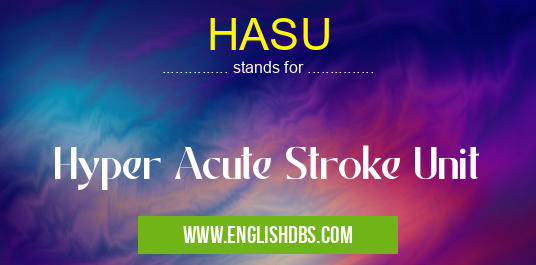What does HASU mean in DISABILITY
Hyper Acute Stroke Unit (HASU) is a specialized medical unit within a hospital that provides immediate and intensive care to patients who have experienced a stroke. Stroke is a sudden loss of blood flow to the brain, which can cause brain damage and disability. HASUs are designed to provide rapid assessment, treatment, and rehabilitation to improve patient outcomes.

HASU meaning in Disability in Medical
HASU mostly used in an acronym Disability in Category Medical that means Hyper Acute Stroke Unit
Shorthand: HASU,
Full Form: Hyper Acute Stroke Unit
For more information of "Hyper Acute Stroke Unit", see the section below.
» Medical » Disability
Function of HASU
HASU's primary functions include:
- Rapid assessment and diagnosis of stroke Triage and prioritization of patients Administration of acute stroke treatments, such as thrombolysis and thrombectomy Monitoring of vital signs and neurological status Initiation of early rehabilitation therapies * Coordination of discharge planning and follow-up care
Benefits of HASU
HASUs have been shown to improve patient outcomes by:
- Reducing the time from symptom onset to treatment Increasing the likelihood of successful reperfusion therapy Minimizing brain damage and disability Improving functional recovery Reducing the length of hospital stay * Lowering mortality rates
Essential Questions and Answers on Hyper Acute Stroke Unit in "MEDICAL»DISABILITY"
What is a Hyper Acute Stroke Unit (HASU)?
A HASU is a specialized unit within a hospital that provides rapid and intensive care for patients who have experienced a stroke or are at high risk of stroke. HASUs are staffed by a multidisciplinary team of healthcare professionals, including neurologists, stroke nurses, and other specialists.
What are the benefits of being treated in a HASU?
HASUs offer several benefits, including:
- Access to specialized care: The team in a HASU has expertise in stroke diagnosis, treatment, and rehabilitation.
- Timely treatment: HASUs provide rapid assessment and treatment, which can minimize brain damage and improve recovery outcomes.
- Comprehensive care: HASUs offer a range of services, including emergency treatment, imaging, rehabilitation, and support for patients and families.
What types of patients are treated in a HASU?
HASUs typically treat patients who:
- Have experienced a stroke or are at high risk of stroke
- Require rapid assessment and treatment
- Need specialized stroke care and rehabilitation
- May benefit from clinical trials or research studies
How long do patients typically stay in a HASU?
The length of stay in a HASU varies depending on the patient's condition and individual needs. Most patients stay for a few days to several weeks.
What happens after a patient is discharged from a HASU?
After discharge from a HASU, patients typically receive follow-up care from their primary care physician or a stroke rehabilitation clinic. This may include:
- Physical and occupational therapy
- Speech therapy
- Cognitive and memory rehabilitation
- Medication management
- Lifestyle modifications
Final Words: HASUs play a crucial role in the care of stroke patients. By providing specialized and timely treatment, HASUs improve the chances of a favorable outcome for patients who have experienced this life-threatening condition. Early recognition of stroke symptoms and prompt referral to a HASU are essential for optimizing patient outcomes.
HASU also stands for: |
|
| All stands for HASU |
